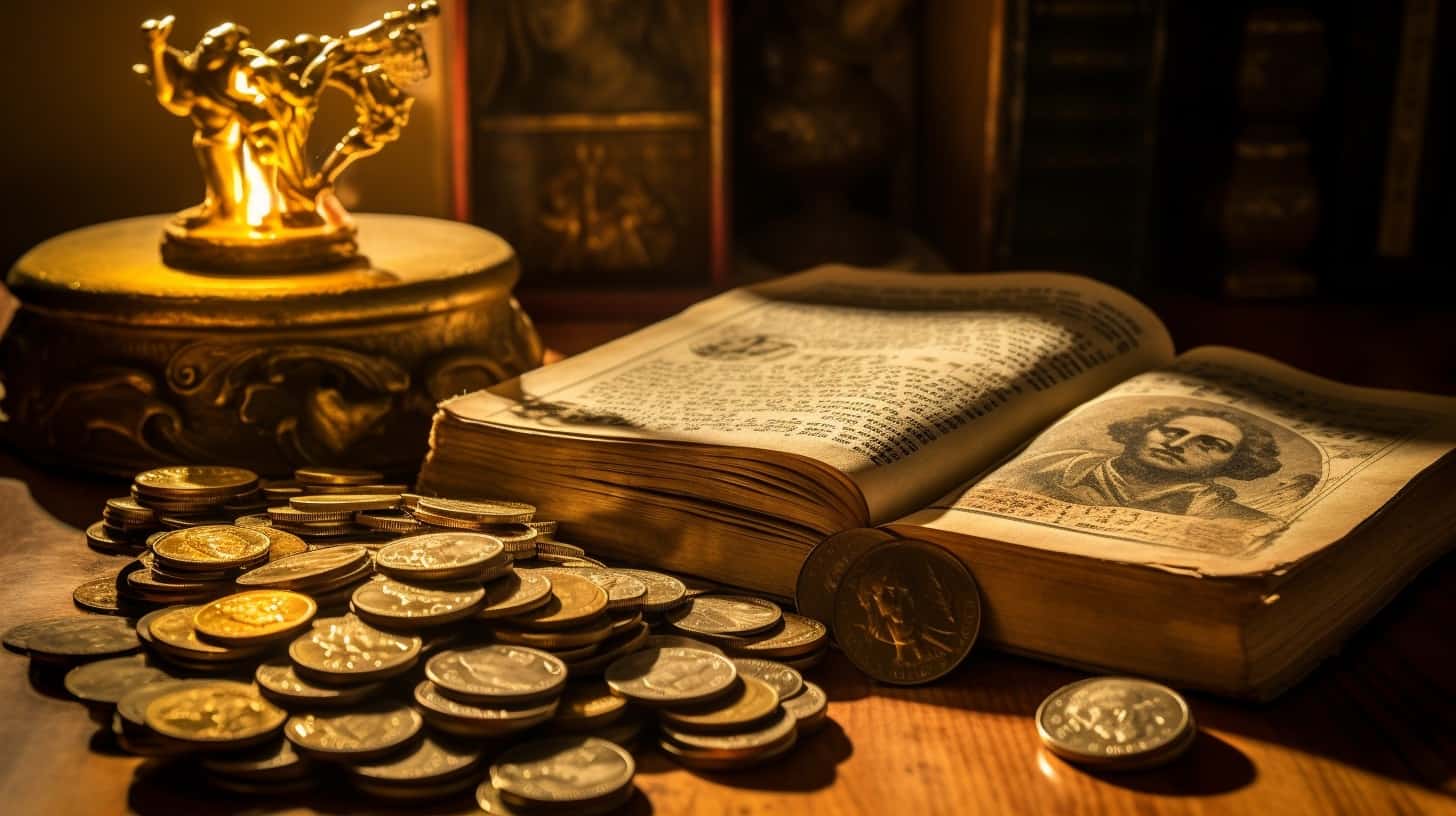Why would I trade a dime for a penny? Trading a dime for a penny may seem like an unfavorable exchange on the surface. After all, a dime is worth 10 cents while a penny is worth just 1 cent. However, there are some scenarios where trading a higher-value coin for a lower-value one can make practical sense.
If you’re short on time, here’s a quick answer to your question: There are niche cases where the total value of multiple pennies exceeds a single dime, so trading up can make mathematical sense. Things like coin collections, arcade games, and foreign exchanges can create specific situations where pennies hold more value.
The Numeric Value of Coins
The base values of each coin
Understanding the numeric value of coins is essential to make informed decisions about their worth. Each coin, whether it’s a dime or a penny, has a specific base value assigned to it. In the United States, for example, a dime is worth 10 cents, while a penny is worth 1 cent.
These values are standardized and widely accepted in daily transactions.
It’s important to note that the base value of a coin doesn’t always reflect its actual market value. Coins can be worth more or less than their face value due to various factors such as rarity, condition, and historical significance.
For example, certain rare pennies can fetch a high price among collectors, even though their face value is just one cent. So, while the base value of a coin is a good starting point, it’s not the only aspect to consider when assessing its overall worth.
Situations where quantities matter more than face value
There are situations where the quantity of coins becomes more important than their face value. This often happens in scenarios where a large number of coins are involved, such as vending machines, toll booths, or arcade games.
In these cases, the sheer number of coins becomes a significant factor, as it determines the total value of the transaction.
For instance, imagine you’re at an arcade and you want to purchase a game that costs $2. While you could use a single $2 bill or two $1 bills, you might also have the option to use an equivalent value in coins.
In this case, trading a dime for a penny might seem counterintuitive, as you would need 200 pennies to reach the $2 value. However, if you have a large quantity of pennies and are looking to lighten your load, trading a dime for a penny could be a convenient way to reduce the overall weight of your coin stash.
It’s also worth noting that in some countries, like Canada, the value of coins is rounded to the nearest five cents during cash transactions. This means that if the total value of your purchase ends in a denomination of one or two cents, it will be rounded down to the nearest five cents.
In these situations, having a surplus of lower-value coins, such as pennies, can be advantageous as they can contribute to rounding up and potentially save you money.
Coin Collecting
Coin collecting, also known as numismatics, is a fascinating hobby that has attracted enthusiasts for centuries. It involves the study and collection of coins, both old and new, to build a comprehensive and valuable collection.
Coin collectors often derive great pleasure from the history, artistry, and rarity of these small pieces of metal.
Filling holes in a collection
One of the main reasons why people engage in coin collecting is to fill holes in their collection. For avid collectors, the thrill of finding a missing coin to complete a set is hard to match. Whether it’s a specific year or denomination, the pursuit of completing a collection can be highly rewarding.
Some collectors even specialize in certain periods or types of coins, such as ancient coins or commemorative coins.
Rarities and mint marks
Another aspect that makes coin collecting enticing is the quest for rarities and mint marks. Certain coins are deemed more valuable due to their scarcity or unique features. For example, coins with errors or misprints are highly sought after by collectors.
Mint marks, which indicate the location where a coin was minted, can also significantly impact a coin’s value. Coins with rare or unusual mint marks can be exceedingly valuable and are highly desired by collectors.
According to the American Numismatic Association (ANA), the most valuable US coin to date is the 1913 Liberty Head nickel. Only five specimens are known to exist, and they have sold for millions of dollars at auction.
Bartering at shows or meets
Collectors often enjoy the social aspect of coin collecting, which includes attending shows or meets where they can buy, sell, and trade coins. These gatherings provide an opportunity for collectors to interact with others who share their passion and to discover new additions to their collections.
Bartering is a common practice at these events, with collectors exchanging coins to enhance their collections. It is a great way to connect with fellow enthusiasts, learn from each other, and expand one’s collection.
The biggest coin show in the United States is the ANA World’s Fair of Money, which attracts thousands of collectors and dealers from around the world. It offers a unique opportunity to see rare coins and engage in the vibrant coin-collecting community.
Whether you’re a novice or an experienced collector, coin collecting can be a rewarding and enjoyable hobby. It combines history, art, and the thrill of the hunt, making it a perfect pastime for those who appreciate the beauty and value of these small pieces of currency.
Arcade and Vending Applications
Penny-only machines
Arcades and vending machines have been a popular source of entertainment and convenience for decades. However, in recent years, there has been a resurgence in penny-only machines. These machines allow players to trade a dime for a penny, offering a unique and nostalgic experience.
Penny-only machines can be found in various locations, such as arcades, amusement parks, and even some retail stores. They attract both children and adults who enjoy the thrill of playing games and winning prizes.
Odd pricing of items
One reason why you should consider trading a dime for a penny is the odd pricing of items in arcades and vending machines. Many of these machines have items priced at odd amounts, such as $0.75 or $1.25.
This can make it difficult for individuals to use traditional coins like dimes or quarters to make exact payments. When you trade a dime for a penny, you can have the exact amount needed to purchase an item without having to worry about receiving a change or overpaying.
Running out of dimes
Another scenario where you should trade a dime for a penny is when you run out of dimes. It can be frustrating to have a pocket full of pennies but not enough dimes to use for arcade or vending machine transactions.
In such cases, it is useful to trade a dime for a penny and continue enjoying their favorite games or snacks.
Foreign Currency Exchanges
Foreign currency exchanges play a crucial role in the global economy, facilitating international trade and travel. They allow individuals and businesses to convert one currency into another, enabling them to transact in different monetary systems.
Understanding the dynamics of foreign currency exchanges can provide valuable insights into the relative values of different currencies, arbitrage opportunities, and even the existence of black market exchanges.
Relative values in other monetary systems
The value of a currency is determined by various factors, including economic indicators, political stability, and market forces. When exchanging currencies, it is important to consider the relative values of the currencies involved.
For example, if the dollar is strong compared to the euro, it means that one dollar can buy more euros. This can be advantageous for travelers or businesses looking to import goods from countries that use the euro, as they can get more for their money.
Understanding the relative values of currencies can also help investors make informed decisions. For instance, if a country’s currency is depreciating due to economic instability, it may be wise to invest in assets denominated in stronger currencies to protect against potential losses.
Arbitrage opportunities
Foreign currency exchanges can create arbitrage opportunities – the practice of taking advantage of price differences in different markets. For example, if the exchange rate for the US dollar is higher in one country compared to another, savvy traders can buy dollars in the lower-priced market and sell them in the higher-priced market, making a profit from the price differential.
This arbitrage activity helps to ensure that exchange rates remain relatively stable across different markets, as the buying and selling pressure helps to equalize prices. However, it is important to note that arbitrage opportunities may be short-lived and may require significant financial resources and expertise to execute successfully.
Black market exchanges
While foreign currency exchanges are typically regulated by governments and financial institutions, black market exchanges can also exist in some countries. These illegal exchanges operate outside the formal banking system and often offer better rates compared to official exchange channels.
However, engaging in black market exchanges carries significant risks, including the possibility of fraud, counterfeit currencies, or even legal repercussions.
Individuals and businesses need to adhere to legal and regulated foreign currency exchange channels to ensure the security and legitimacy of their transactions. Consulting reputable sources, such as financial institutions or government websites, can provide valuable information on authorized exchange providers and the latest exchange rates.
Why Would I Trade A Dime For A Penny – Conclusion
While a dime’s base value exceeds a penny’s, there are some niche situations where the math makes trading a dime for a penny worthwhile. Coin collections, vending machines, arcades, and foreign currencies create specific scenarios where quantities of pennies hold more practical value than a single higher-value dime.
So don’t dismiss a dime-for-penny swap out of hand – look closer, and that odd trade might just make cents!


